CAPE ELIZABETH — James Senbeta let nine-time wheelchair champ Tony Nogueira stay close for three miles before starting to climb the hills along the Beach to Beach course and pulling away to win the wheelchair division in a course-record time of 21 minutes, 46 seconds.
Senbeta, a newcomer to the race, broke the record of 21:53 set by Krige Schabort of Cedartown, Georgia, in 2013. Senbeta finished the 6.2-mile course ahead of a field of three after two other competitors dropped out.
A winner of the Boston Marathon wheelchair race who also holds the course record for the Falmouth Road Race, Senbeta has wanted to race in Beach to Beacon since he started wheelchair racing two years ago at age 25. Senbeta said for wheelchair racers the world’s best usually reach their prime in their late 30’s, and he is just getting started.
His only competition, nine-time-winner Nogueira, finished second in 22:17 in his 15th Beach to Beach race. Nogueira shook his head with a smile as he crossed the line, acknowledging the mantle had been passed.
“I’m a dinosaur,” laughed Nogueira, 47, of Glen Ridge, New Jersey.
Senbeta is coming off training for the U.S. National Paralympics Championships, where he took second in the 800 meters and third in the 1,500 and 5,000 last month. His hope is to qualify for the Rio Olympics in 2016.
“I wasn’t focused on the course record,” said Senbeta, of Champaign, Illinois. “The plan was to get through the race and get ready for the Pan American Games on August 10 to 15 in Toronto. I always wanted to do this race, but the last time it was the week before the Falmouth race. I would like to do this again next year, but I’ll be training to make Paralympics, so I’ll have to see.”
In the women’s race, three-time champion Christina Kouros of Cape Elizabeth, the lone female competitor, finished in 39:39 in her fifth Beach to Beacon. She was just 6 seconds off her best time. After graduating this spring from the University of New Hampshire with an associates degree, Kouros, 20, said she hopes to train harder and compete in more races next year.
“The course felt a lot faster this year. And I was close to my best time. I’d definitely like to do more road races,” Kouros said.
DOTTIE GRAY, 90, of Kirkwood, Missouri, was honored again this year as the Johnny Kelley Award winner as the oldest finisher. She started the race an hour early along with Boston Marathon bombing survivor Karen Rand McWatters. McWatters lost the lower portion of her left leg in the bombing attack in 2013.
“I was worried that people would be upset that we got special treatment,” McWatters said. “But people along the course were wonderful.”
For Gray, the early start gave her a chance to run without being jostled. Granddaughters Helen and Roz Gray-Bauer and their friend, Lucy Crane, accompanied Gray, who has completed 15 Beach to Beacons.
“I felt really good until just that last mile. I always do fine until those last hills,” said Gray, who finished in 1 hour, 53 minutes and 8 seconds – 3 minutes, 26 seconds faster than her 2014 time.
It was the first time race officials allowed someone to start early.
“I think it was just wonderful that (Joan Benoit Samuelson) did that,” Gray said. “I wasn’t so far behind and I felt better. It was so nice of them to do all of that.”
Gray said she wasn’t passed by the elite runners until after she’d run five of the 6.2 miles.
Race organizers had been told this would be Gray’s last appearance at the Beach to Beacon. Asked if she would be back next year, Gray said, “We’ll see. That’s a long way off.”
It took a little more than two hours, but McWatters completed the 6.2-mile course.
“First time I’ve ever crossed a finish line,” she said.
Invited by Samuelson to be the honorary starter in 2013, McWatters returned last year to volunteer. She said she had to stop a few times to wipe sweat from the prosthesis.
At the awards ceremony atop a hill overlooking the lighthouse, Samuelson congratulated all runners, but made special mention of McWatters. “Karen, you truly tell the Beach to Beacon story,” Samuelson said. “My hat, which is usually on, is off to Karen and to all of you who bring the inspiration to this event to keep it going.”
McWatters said one finish line is plenty for her.
“I’m done,” she said with a laugh. “I’m going back to volunteering.”
Two hours after the race start with the temperatures in the 80s, the medical tent was full. More than 20 ice buckets the size of bathtubs were filled with ice and 16 runners were in them looking worn and out of breath as they waited to bring their body temperatures up.
Dozens of medical personnel moved through the tent as a steady stream of runners came in, some in wheelchairs. But the influx of runners who were overheating was par for the course, said medical tent director Chris Troyanos, who has run the medical tent at the Boston Marathon and for the Beach to Beacon the past 14 years.
“We got hit hard right now. It’s hot, but not overly hot. We get an influx every year,” Troyanos said. “This is not the worst year. The worst year we had 135. It’s the humidity that does it.”
An hour after the race started with hundreds of runners still jogging in, Dave Jackiewiecz pushed his 10-foot-high white lighthouse across the line for the fifth time. After building the rolling beacon for the race, Jackiewiecz continues to race inside the hollow structure to raise the spirit of those at the back of the pack.
“I built this myself. I don’t get any special treatment. I like to run in the back of the pack to motivate people,” said Jackiewiecz, 34, who on cooler years has finished with his rolling lighthouse in under an hour.
TOP AMERICAN female finishers Alexi Pappas, Liz Costello and Laura Thweatt all raved about the experience of staying with a host family for the Beach to Beacon.
Pappas has stayed with Lisa and Chip Leighton each of her three years attending the race. Her first 10K was at the 2013 Beach to Beacon.
“It all kind of feels like my distance running career started here in Maine,” Pappas said. “I’ve always felt a connection with Maine. I love my host family. I stay with the Leightons and they are amazing. Their daughter gives up her princess bed to me. It’s those little things about Beach to Beacon that make it so special.”
Costello now lives in Newton, Massachusetts, but she took advantage of the host family arrangement to stay with Linda Greer in South Portland. The arrangement also paid off for Greer. In her seventh Beach to Beacon, Greer ran an eight-minute personal best.
“It’s awesome to have an athlete in your house,” Greer said. “I had a strategy I worked out with Liz.”
Thweatt, who hails from Colorado, said she appreciated that her host family took her on a day trip to view lighthouses and into Portland.
“It just makes the whole experience more low-key and fun and I liked that,” Thweatt said.
RUNNERS WHO participated came from 15 countries and 41 states. Maine runners represented 260 cities and towns from across the state with the largest contingent coming from Portland (919) and Cape Elizabeth (765).
JEFF JONES had never run the Beach to Beacon 10k before Saturday. He’s glad he did.
Jones, from Chelsea, just outside of Augusta, was the top male masters runner (age 40-or-over). He originally didn’t believe race officials when they told him he won the category.
Jones, 45, completed the race in 34 minutes, 2 seconds, but wasn’t concerned about a time.
“I didn’t look at my watch much today,” he said. “I just kind of ran with some other people, I didn’t want to get caught up with looking at my time.”
He said it was a great day to run.
“It was a beautiful Maine summer day, what more could you want?” he said. “It was a great first experience, the course was well marked and there are a lot of great volunteers.”
Sheri Piers, 44, of Falmouth, won the female masters category with a time of 35:38.
RACE DIRECTOR Dave McGillivray once again ran the course, something he does every now and then.
“It’s very interesting to participate in an event that you run,” he said. “You’re trying to get a sense of it. You’re looking for things that we can improve upon or aren’t going well. And I was digging. I really didn’t find anything, maybe the lines at the porta-johns at the start of the race. I want to fix that.”
He said the day went as well as can expected.
“It was a banner year,” he said “People know their roles better and better. One of the most important assets you can have in putting on an event is experience.”
Kristen Miale, the president of the Good Shepard Food Bank, which was the race’s charity beneficiary, received a $30,000 check from race officials, but said that is just the start. The race gave the Good Shepard Food Bank excellent exposure.
“The money, obviously, is wonderful,” she said. “But we were able to introduce a lot of people to our work. They learned more about the problem of hunger. This race always go to a beneficiary that benefits the health and well-being of children. And this will remind them that one in four children in Maine go hungry.”
Miale also ran the race for the first time and said it was an incredible experience. She saw people ringing many of the cowbells that her organization handed out.
“I did train,” she said. “I trained enough so I wouldn’t be in pain. And I felt wonderful.”
THE NUMBER of legacy runners – those who have taken part in every Beach to Beacon since the inaugural 1998 edition – dropped to 120 this year because of the tragic death of Phil Ortolani, a Cape Elizabeth resident who was struck by a car while walking on a sidewalk in Florida in March.
Fellow Cape resident and legacy runner Jim Toulouse described Ortolani as “the mayor of Shore Road” for his friendly manner and familiar gait.
Race organizers gave a bib to his son, Alex, who wrote “For Phil” on it in black magic marker.
“My father loved running, and he loved this race in particular,” said Alex, whose mother and sister and several others wore T-shirts that read “B2B 2015” and “For Phil” along with a mustache.
“For us, this is a day to remember him and the many miles he ran along these roads.”
Race organizers paid tribute to the town of Cape Elizabeth, which is celebrating its 250th anniversary of splitting off from Portland (then known as Falmouth) in 1765.
Samuelson, who turned 58 in May, grew up on Wood Road, not far from Fort Williams. She remembers the town’s 200th anniversary celebration and still has a commemorative booklet from 1965.
“I’ve really been running since that time,” she said. “I don’t know where those 50 years went, but I’m not going to ask any questions. I just want to thank the town of Cape Elizabeth for continuing to support my habit.”
KELLY LACROIX woke before dawn from her home in Greene in order to pick up a colleague and drive more than an hour to arrive in Fort Williams before roads closed. Her first customers arrived before 9 a.m. and the final one climbed off her padded table shortly at 11:08.
“As a massage therapist, I’m usually in an office by myself all day,” she said, looking around at a tent covering 18 tables. “So when you’re in a group like this, you get a peer-to-peer, co-worker kind of feeling. It’s great.”
LaCroix said she particularly enjoys volunteering at Beach to Beacon because of the ocean breeze, the variety of adjacent vendors and the fact that a 10K race doesn’t extract a huge toll on runners.
“Usually the marathons are the worst,” she said. “The runners are a lot sweatier, and the real competitive ones who are going for a time don’t stop to go to the bathroom.”
Staff Writers Deirdre Fleming, Glenn Jordan, Mike Lowe and Steve Craig contributed to this story.
Send questions/comments to the editors.


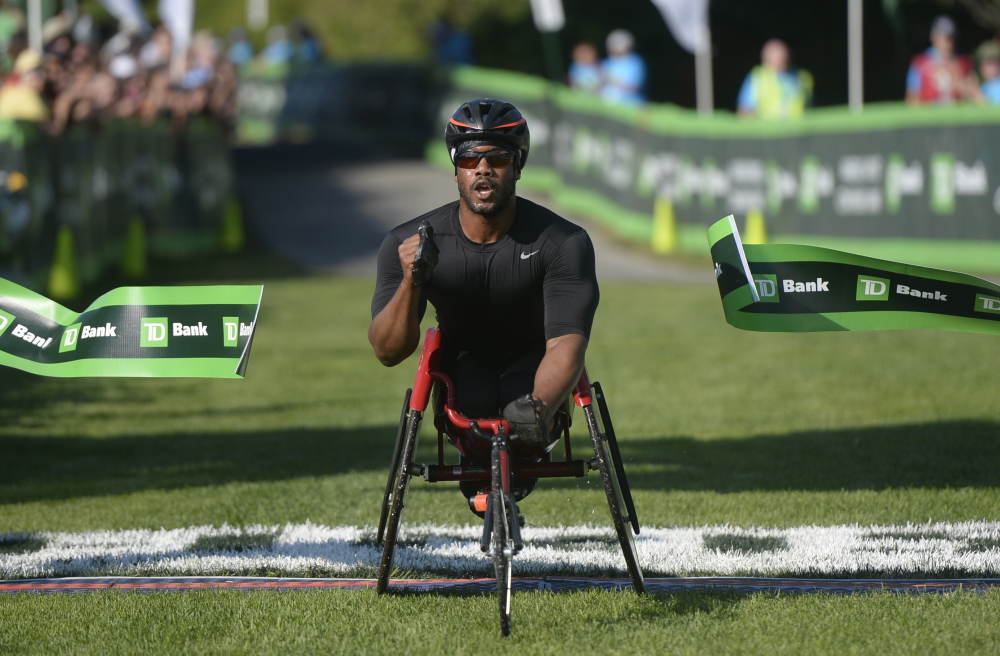
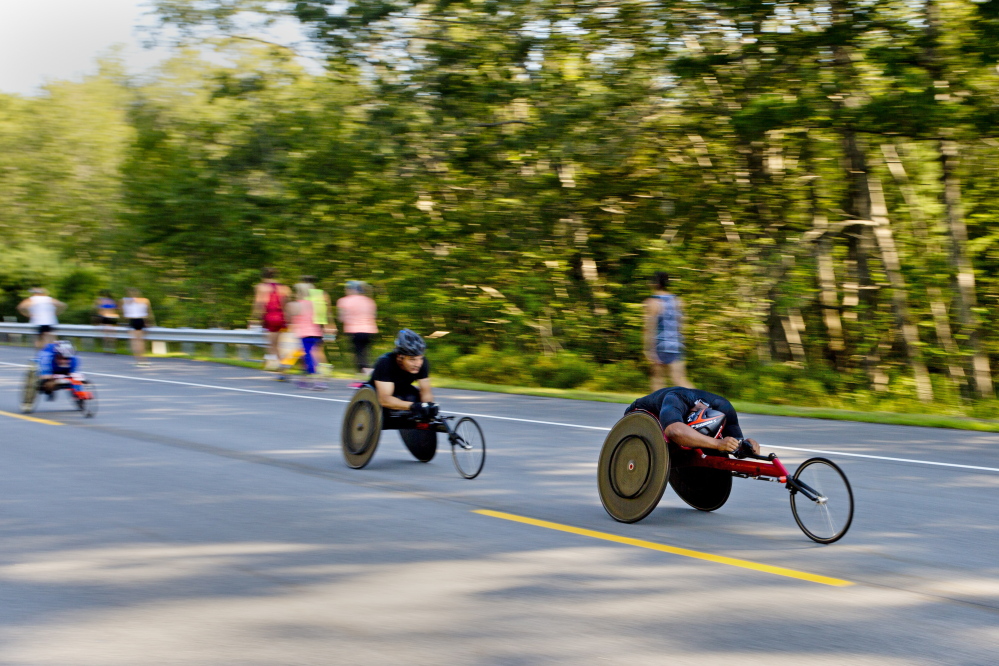
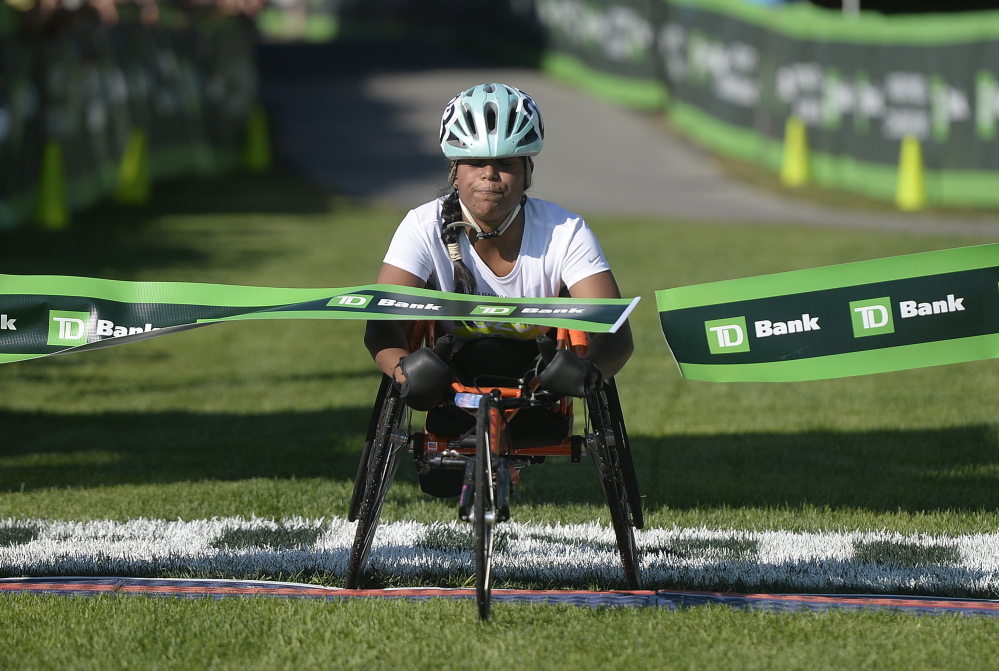
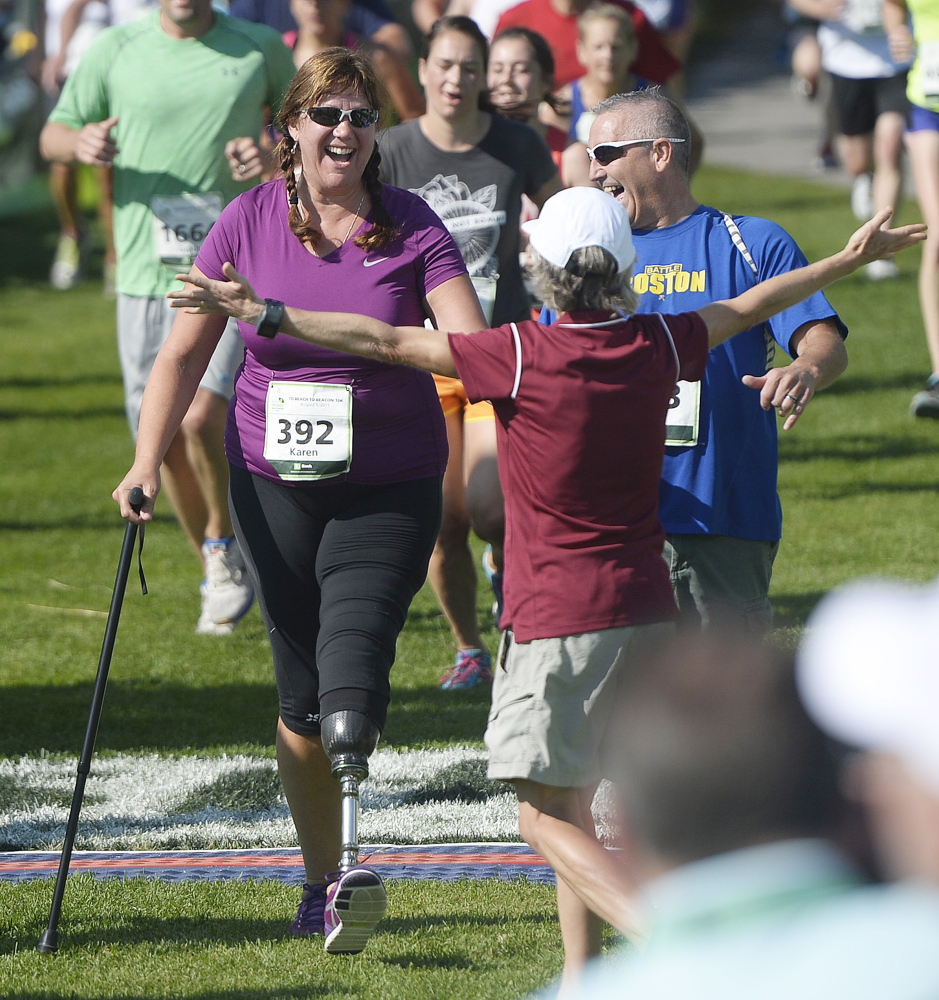
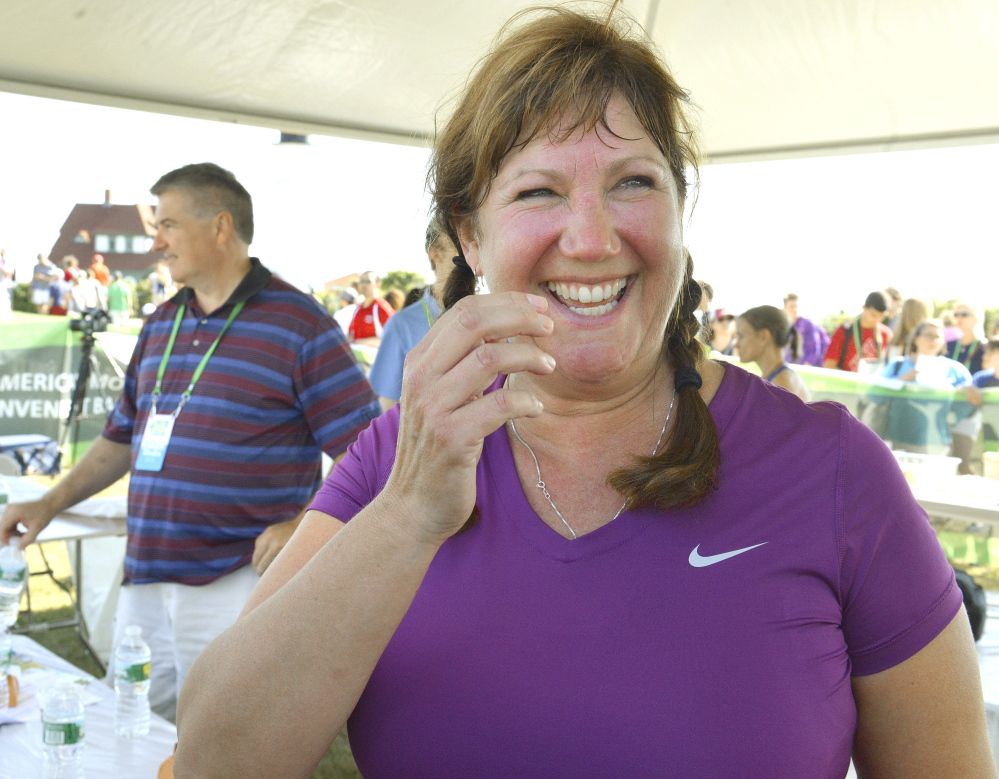
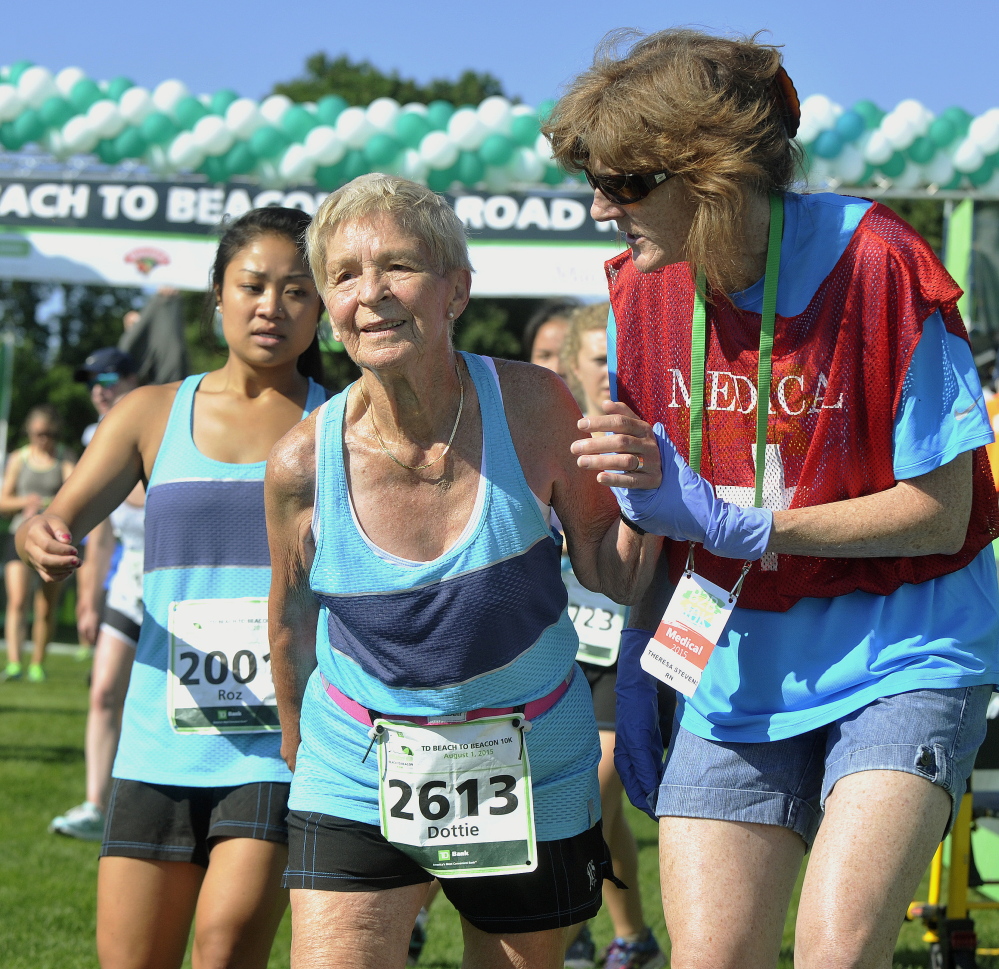

Success. Please wait for the page to reload. If the page does not reload within 5 seconds, please refresh the page.
Enter your email and password to access comments.
Hi, to comment on stories you must . This profile is in addition to your subscription and website login.
Already have a commenting profile? .
Invalid username/password.
Please check your email to confirm and complete your registration.
Only subscribers are eligible to post comments. Please subscribe or login first for digital access. Here’s why.
Use the form below to reset your password. When you've submitted your account email, we will send an email with a reset code.